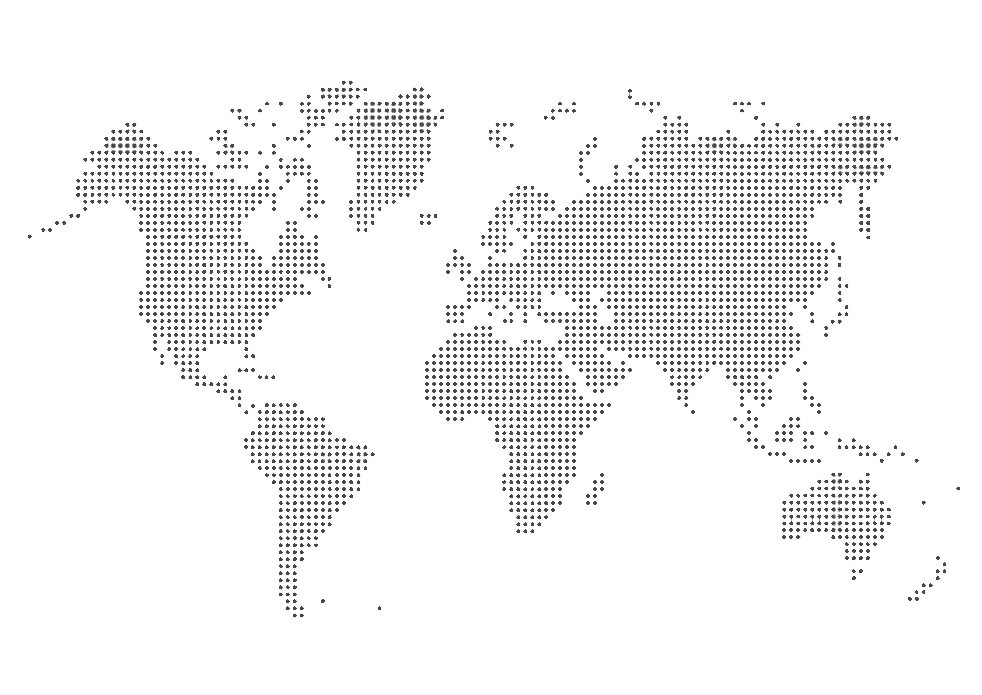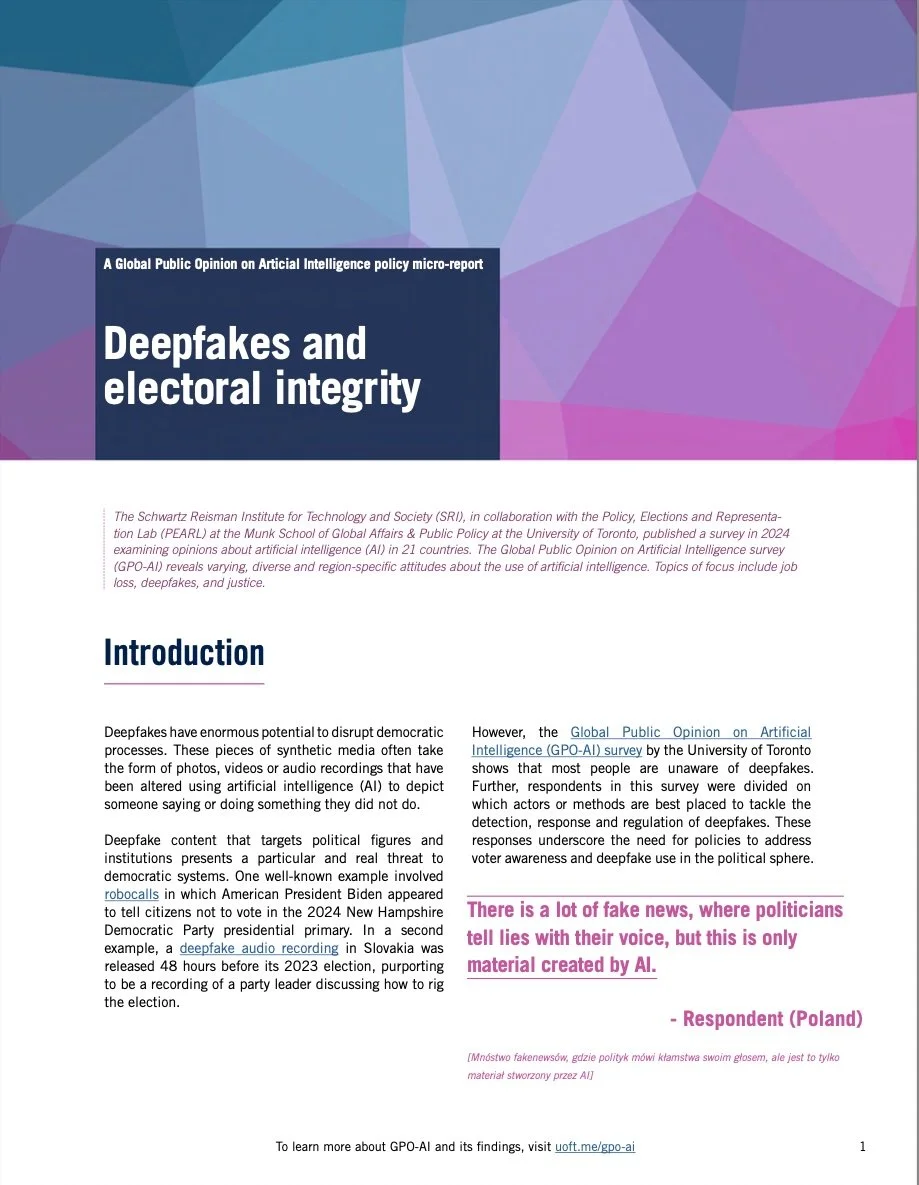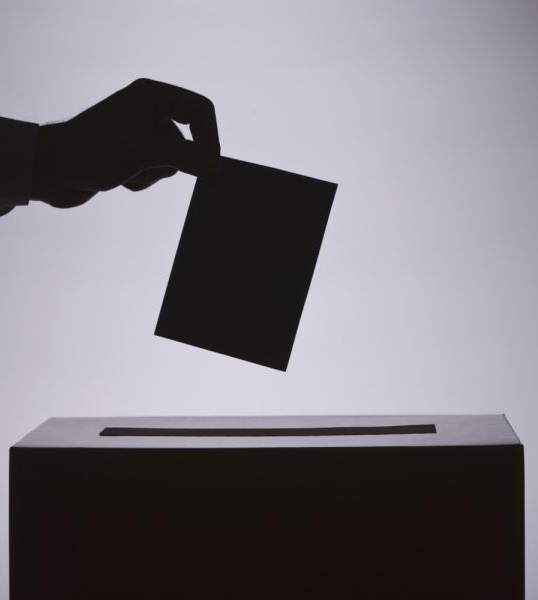Schwartz Reisman Institute for Technology and Society
Global Public Opinion on
Artificial Intelligence
(GPO-AI)
Schwartz Reisman Institute for
Technology and Society
Welcome to the
2024
GPO-AI Report
The Global Public Opinion on Artificial Intelligence survey (GPO-AI) examined opinions about artificial intelligence (AI) in 21 countries. The GPO-AI report reveals varying, diverse and region-specific attitudes about the use of artificial intelligence, and topics of focus in the survey include job loss, deepfakes, and state regulation.
GPO-AI is a report created by the Schwartz Reisman Institute for Technology and Society (SRI) in collaboration with Policy, Elections, and Representation Lab (PEARL) at the Munk School of Global Affairs & Public Policy at the University of Toronto.
GPO-AI was led by Peter Loewen, who was previously Associate Director of the Schwartz Reisman Institute for Technology and Society, the Director of the Munk School and Robert Vipond Distinguished Professor in Democracy at U of T’s Department of Political Science. Loewen’s research focuses on how politicians can make better decisions, how citizens can make better choices, and how governments can address the disruption of technology and harness its opportunities.
Read a summary of GPO-AI’s key findings.
Explore key findings from the report.
A Global Public Opinion on Artificial Intelligence
policy micro-report
Deepfakes and
electoral integrity
About
The Schwartz Reisman Institute for Technology and Society
Located at the University of Toronto, the Schwartz Reisman Institute for Technology and Society’s mission is to deepen our knowledge of technologies, societies, and what it means to be human by integrating research across traditional boundaries and building human-centred solutions that really make a difference. The integrative research we conduct rethinks technology’s role in society, the contemporary needs of human communities, and the systems that govern them. We’re investigating how best to align technology with human values and deploy it accordingly. The human-centred solutions we build are actionable and practical, highlighting the potential of emerging technologies to serve the public good while protecting citizens and societies from their misuse. We want to make sure powerful technologies truly make the world a better place—for everyone.
About
The Policy,
Elections &
Representation
Lab
(PEARL)
The Policy, Elections & Representation Lab (PEARL) at the Munk School of Global Affairs & Public Policy at the University of Toronto investigates key questions related to political decision-making, representation, the societal and political implications of COVID-19 and the impact of technology on governance. PEARL team members use empirical methods based primarily on survey data, experimental research, and social media data, to understand how society and politics are shaped by attitudes and behaviours. Their work has been published in leading academic journals, featured by the media, and used by a wide range of stakeholders, including policymakers around the world.
Conference Agenda
Session 1 - Envisioning Success & Identifying challenges
9:00 am PST / 12:00 pm EST - Session 1 Opening Remarks
9:20 am PST / 12:20 pm EST - Break-outs: What does success look like? How do we get there?
10:30 am PST / 1:30 pm EST - Break-out Group Feedback & Afternoon Preview
10:50 am PST / 1:50 pm EST - Speed Networking
Break
11:10 am PST / 2:10 pm EST - Break (optional small group networking)
Session 2 - From principles to practice
12:10 pm PST / 3:10 pm EST - Session 2 Opening Remarks
12:50 pm PST / 3:50 pm EST - Break-outs: “Excavating the Why” & “What if there were…”
2:00 pm PST / 5:00 pm EST - Break-out Group Feedback
2:15 pm PST / 5:15 pm EST - Session 2 Closing Remarks
2:35 pm PST / 5:35 pm EST - Wrap-up Q&A & Convening Closing Remarks
3:00 pm PST / 6:00 pm EST - End






